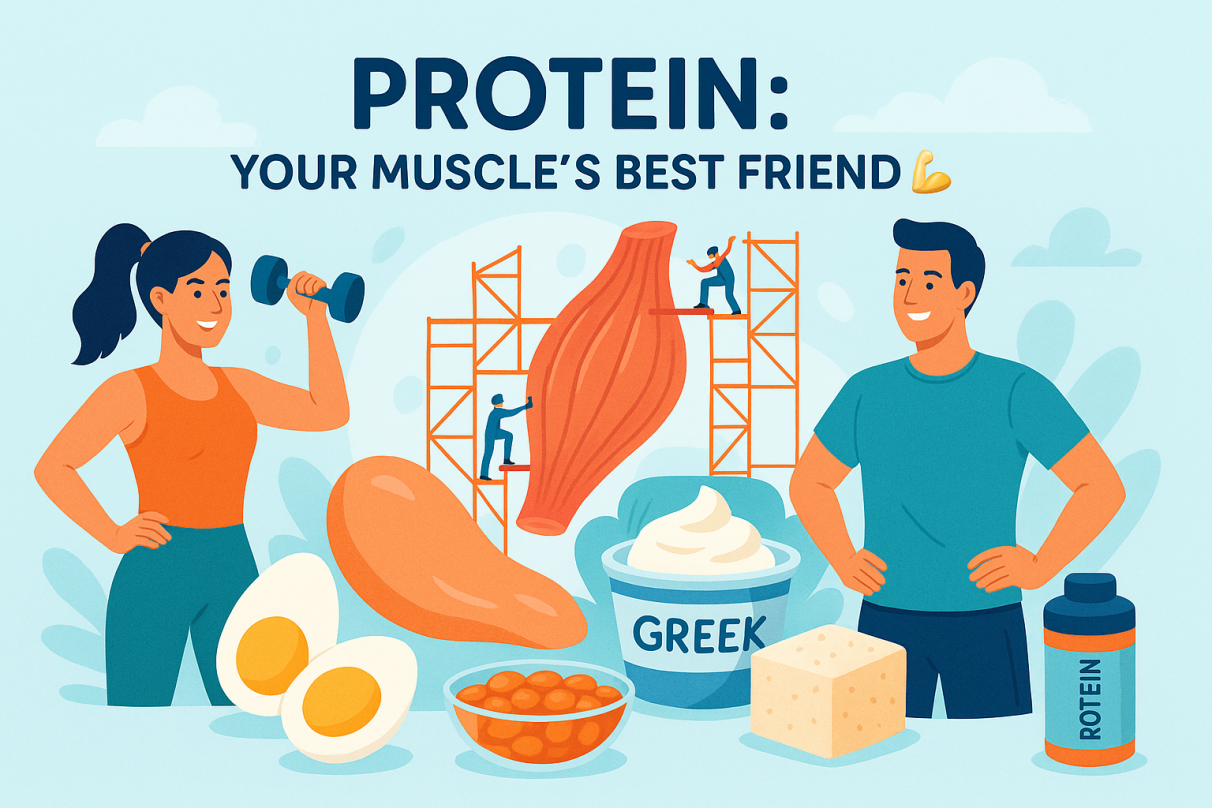The Macronutrients Trio: Protein, Carbs, and Fats

Let’s break down the “big three” nutrients your body needs in large amounts – macronutrients – and see how each supports your fitness journey:
Protein: The Builder Upper ??
Protein is often called the building block of muscle, and for good reason. When you exercise (especially resistance training like weightlifting or bodyweight exercises), you create tiny micro-tears in your muscle fibers. Protein helps repair those fibers, rebuilding them a little stronger each time. This process is how we gain strength and tone up.
Why you need it: Beyond muscle repair, protein is crucial for many body functions – from making enzymes and hormones to supporting your immune system. For active individuals, getting enough protein is vital to recover and to protect lean muscle mass, especially if you’re also trying to lose fat.
How much: You might be wondering, “How much protein do I actually need?” The average sedentary person needs about 0.8 grams per kilogram of body weight. But if you’re exercising regularly, you need more. Dietitians and sports experts suggest somewhere around 1.2 to 1.7 grams of protein per kg of body weight per day for people wh (Nutrition for the Athlete – 9.362 - Extension)17-L21】. Let’s put that in perspective: if you weigh 70 kg (154 lbs), that’s roughly 84–119 grams of protein daily. Another simpler rule some follow is aiming for ~20–30 g of protein per meal (like a chicken breast or a scoop of protein powder, for example).
Sources: You can get protein from both animal and plant sources. Lean meats (chicken, turkey), fish, eggs, and dairy (Greek yogurt, cottage cheese) are excellent protein sources. If you’re vegetarian or just like variety, beans, lentils, tofu, tempeh, edamame, nuts and seeds are great options too. Additionally, protein shakes or bars can help – a quality whey protein shake (whey is a protein from milk) or a plant-based protein powder is super handy to gulp down after a workout or as a quick breakfast. (We’ll talk more about supplements later.)
Timing: Your muscles are hungriest for protein right after workouts. It’s a good idea to consume some protein within a couple hours after exercise, ideally within the first 30–45 minutes for optimal muscle repair. In fact, for women, research suggests refueling with protein sooner rather than later is beneficial – within about 30 minutes post-exercise – because it helps counteract muscle br (Feeding your fitness - Harvard Health)8-L107】. Men might have a slightly longer window (up to 2 hours), but the sooner the better for everyone. This doesn’t mean you must chug a shake the minute you re-rack the weights, but don’t wait until, say, 3 hours later either.
Don’t overdo it: More protein is not always merrier. Your body can only use so much at a time. Consistently eating beyond your needs won’t magically build extra muscle – the excess will either be burned for energy or stored (yes, even protein can turn into fat if you eat way too much). As one sports nutrition fact sheet notes, eating protein beyond your nutritional needs **has not been shown to increase muscle bui (Nutrition for the Athlete – 9.362 - Extension)23-L30】. So aim for the recommended amount, spread through the day, and you’ll be golden.
Example to bring it home: Meet Laura, a 30-year-old who just started CrossFit. At first, she wasn’t paying attention to protein – she might have a small salad for lunch and pasta for dinner, and wonder why she felt sore all the time. Once she calculated her needs, she realized she was getting only ~50g of protein when she actually needed about 100g. Laura started incorporating protein each time she ate: a yogurt and boiled egg at breakfast (18g), grilled chicken salad at lunch (30g), a protein bar snack (15g), and salmon with quinoa and veggies for dinner (35g). Total ~98g. Within weeks, she felt less sore and more toned. It’s not magic, it’s just giving your body what it needs to rebuild. ?










Comments : 0